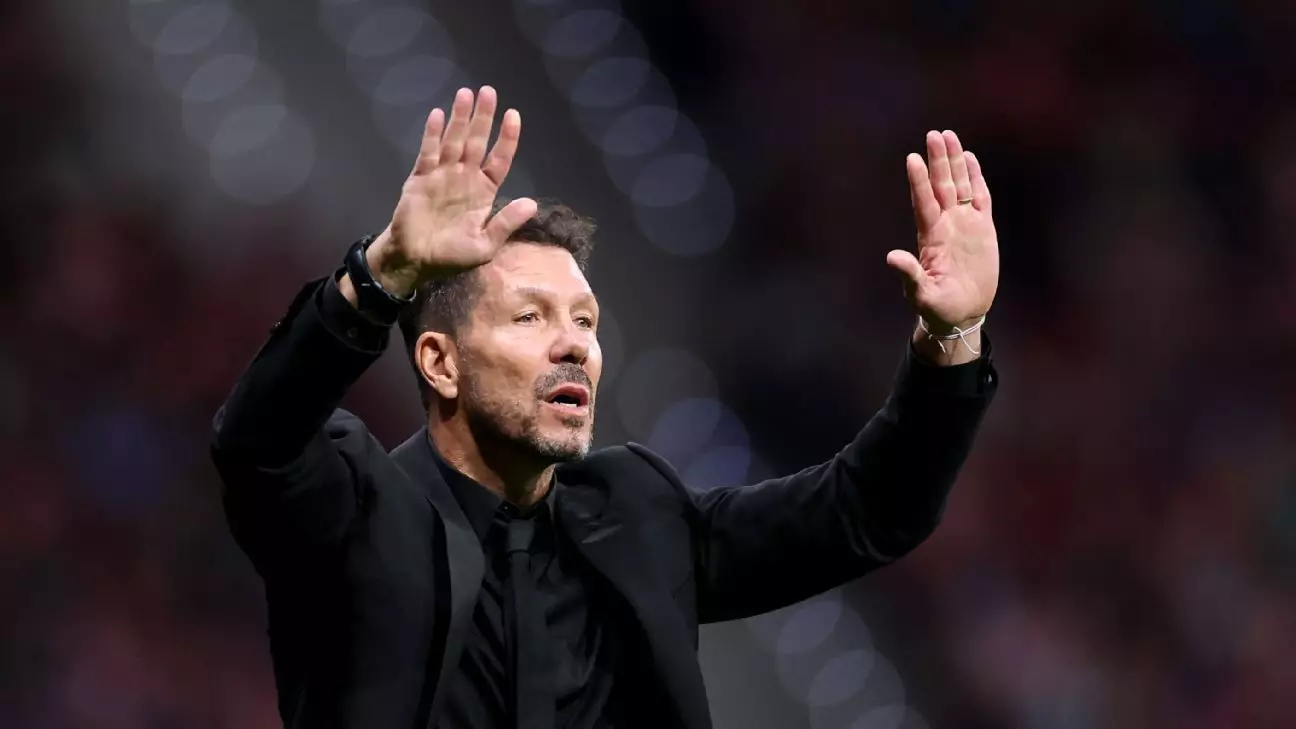In the illustrious rivalry between Atlético Madrid and Real Madrid, passion often runs high, and emotions frequently spill over. However, recent events during a LaLiga match have thrown a glaring spotlight on the intersection of fervor and toxicity in football fandom. Following an instance where the game was suspended due to fans throwing objects onto the pitch, both coaches, players, and the football community at large have been called upon to reflect on accountability—not just from supporters but also from those who grace the field.
The recent Madrid derby faced disruption in the second half as fans began throwing lighters and bottles, provoking a temporary halt in play. Despite the sporting tensions inherent in such rivalries, the actions of a minority have marred a fixture celebrated for its intensity. It was a moment that saw the ignominy of football’s darker aspects—where one’s passion turns destructive rather than supportive.
Diego Simeone, the Atlético Madrid coach, expressed his frustration not only at the fans but also at the players. He noted that certain actions on the pitch might inadvertently incite negative reactions from supporters. His comments underscored a much-overlooked aspect of football: the responsibility players possess as role models and the impact of their celebratory conduct on fan behavior.
Simeone’s assertion that players can provoke fan reactions highlights a crucial relationship that often gets overshadowed in post-match analyses: the interplay between player actions and fan sentiments. Celebratory gestures made with disregard to the surrounding fans can stoke already heightened emotions, leading to regrettable outcomes. It opens a dialogue about the need for players to maintain a level of decorum in their celebrations, especially during matches where the stakes—both emotional and competitive—are particularly high.
The clash between responsibility and enthusiasm appears to generate an environment where emotional maturity is crucial. The fans’ actions, while indefensible, invite scrutiny of player behavior. It thrives on a culture of respect that both players and supporters should cultivate collectively.
Implications for Club Culture and Security
As the dust settles after this incident, it becomes clear that further measures are necessary to prevent similar occurrences. Atlético Madrid’s swift response—including collaboration with local authorities and commitment to identify those responsible—signals a robust approach to security. However, it must go beyond reactive measures.
Football clubs need to foster a culture that emphasizes sportsmanship, respect, and the responsibility fans and players alike owe one another. This incident serves as a reminder that while fans can make or break the atmosphere in a stadium, players also have a unique influence that can either unify or divide.
Moreover, clubs must implement educational campaigns that inform fans about acceptable behavior and the repercussions of misconduct. Such initiatives can enhance the matchday experience, assuring that it remains a celebration of talent and camaraderie rather than one marred by violence and chaos.
The Repercussions of Racism and Hostility
Worryingly, this incident occurred amidst broader discussions concerning racist behaviors within football fandoms. A social media campaign promoting hostile actions towards Real Madrid’s Vinícius characterized the anxiety surrounding every clash between these two giants. The very notion that social media can be used to encourage racism in such a public context is deeply unsettling and demands a reconciliation of football with societal values.
LaLiga’s decision to leverage police resources to investigate the promoters of racially charged campaigns speaks to a crisis that extends beyond a single match. The imperative for clubs to adopt a zero-tolerance policy towards racism becomes crystal clear; they must protect the integrity of the sport and ensure it is an inclusive environment for everyone involved.
The Future: Learning and Growing from Adversities
Ultimately, the Madrid derby of recent weeks serves as a poignant reminder of the challenges faced within football. Those involved—clubs, players, and fans—must learn from these incidents to cultivate a more positive atmosphere in which passion can flourish without veering into hostility.
As key figures like Simeone comment not only on the actions of fans but on the responsibilities of the players themselves, it is clear that no party exists in isolation. Collective maturation of attitudes on and off the pitch may hold the key to healing the rifts that such incidents bring to light and ensuring that the spirit of football thrives in harmony. Such evolution will not only protect the sport’s reputation but also ensure that all fans can participate in a safe and respectful environment.

